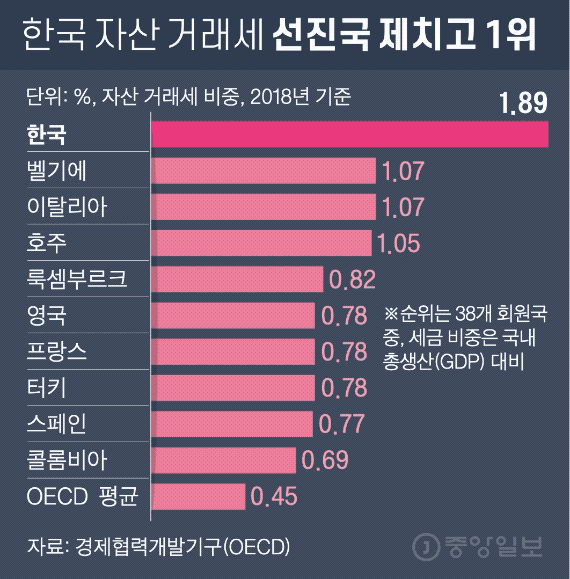It was found that the tax paid for holding and trading real estate in Korea is the third largest among OECD member countries. According to Rep. Gyeong-jun Yoo on the 15th, domestic real estate-related taxes (holding tax, asset transaction tax, capital gains tax, etc.) reached 4.05% of nominal gross domestic product (GDP) in 2018.
Only two countries, the UK (4.48%) and France (4.43%), had a higher ratio of real estate tax to GDP than Korea. The United States, which is known to pay a lot of real estate ownership tax, also ranked fourth with only 3.97% of real estate tax. Even compared to the average of the real estate tax share of 38 OECD member countries (1.96%), Korea was more than twice as high.
![Graphic image of Korea's asset-trading tax, surpassing advanced countries. [자료제공=경제협력개발기구(OECD)]](https://i0.wp.com/pds.joins.com/news/component/htmlphoto_mmdata/202102/15/736492fb-9410-47df-8be8-4b312d482d85.gif?w=560&ssl=1)
Graphic image of Korea’s asset-trading tax, surpassing advanced countries. [자료제공=경제협력개발기구(OECD)]
Among the real estate taxes, transaction taxes were particularly large in proportion to other countries. According to Assemblyman Yoo, the amount of the asset transaction tax in Korea in 2018 was 1.89% of GDP, which ranked first among 38 OECD countries. The overall average (0.45%) was more than 4 times. Asset transaction tax is levied when trading real estate and financial assets, such as employment/registration tax and securities transaction tax. The largest proportion of these is the real estate transaction tax.
![Capital gains tax (personal basis) is the third place graphic image. [자료제공=경제협력개발기구(OECD)]](https://i0.wp.com/pds.joins.com/news/component/htmlphoto_mmdata/202102/15/9935ce5e-9e3f-4367-bc9c-3080faaba641.gif?w=560&ssl=1)
Capital gains tax (personal basis) is the third place graphic image. [자료제공=경제협력개발기구(OECD)]
Capital gains tax (individual basis) also ranked third at 0.95% of GDP. ‘Inheritance and gift tax’ was ranked 4th among OECD countries with 0.39% weighting.
The low proportion of taxes is the’real estate tax’ (holding tax, comprehensive real estate tax + property tax). Rep. Gyeong-jun Yoo estimated the proportion of Korea’s real estate property tax at 0.82% of GDP in 2018, ranking 18th among OECD countries.
However, even this is estimated to have exceeded the OECD average (1.07%) as the proportion increased to 1.20% last year. This is because the government strengthened the tax rate for multi-homed and high-priced homes in 2019 and last year to set the price of a house. In addition, the public price, which is the standard for imposing real estate property tax, has been gradually increased.
Taxes have risen, but wealth inequality has worsened. The’real estate Gini coefficient’, which Congressman Yoo estimated based on data from the National Statistical Office, rose from 0.491 in 2017 to 0.513 last year. The closer this number is to 1, the higher the degree of inequality. Although the government strengthened taxes, saying it would prevent unearned income from house prices, the gap between rich and poor in assets was widening.
Sejong = Reporter Kim Namjun [email protected]
